The way history is – or perhaps was – taught strikes me as peculiar. I studied the subject to a reasonably advanced level a long time ago and learned far more about what happened in Germany and Russia between about 1860 and 1917 than what went on here. I caught up with our own kings and queens more recently, via Peter Ackroyd’s brisk but magisterial trot through English history to the 19th century (five volumes, highly recommended). What a ghastly gallery of gangsters, narcissists and dissolutes. With the odd exception. Often by the standards of their own time. Yet still we venerate them, as if they are absolved by an accident of birth.

Perhaps they are thus absolved; I had not realised just how brutally Darwinian life as an aristocrat could be.
At all events, no one could reasonably argue that we should not learn about our monarchs. They wielded the power that substantially bequeathed the society we live in now. Our past cannot be turned into a morality tale or airbrushed. A historian who cherry-picks facts to suit a ‘patriotic’ narrative is not much of a historian (will someone tell Michael Gove?).
So it is with slavery and colonialism, and the claim that somehow we are seeking to erase history by revisiting the role of people and institutions in those contexts. The opposite is true. It might be uncomfortable for the Law Society to research its own relationship with slavery and colonialism, but as the organisation approaches it bicentenary later this decade such a reckoning must be part of any historical evaluation.
Incidentally, this needn’t mean bundling portraits of every Victorian president into the Chancery Lane cellar. When I was at school, a large painting of Elizabeth I, ineffably regal in her chilly pomp, gazed down upon us at morning assembly. This was hardly considered an instrument of oppression for the many observant Catholics in the room. She was part of the school’s history and in that sense part of us.
The past is messy, contradictory and often ambiguous. But it does a disservice to the present to try and hide from it.































6 Readers' comments